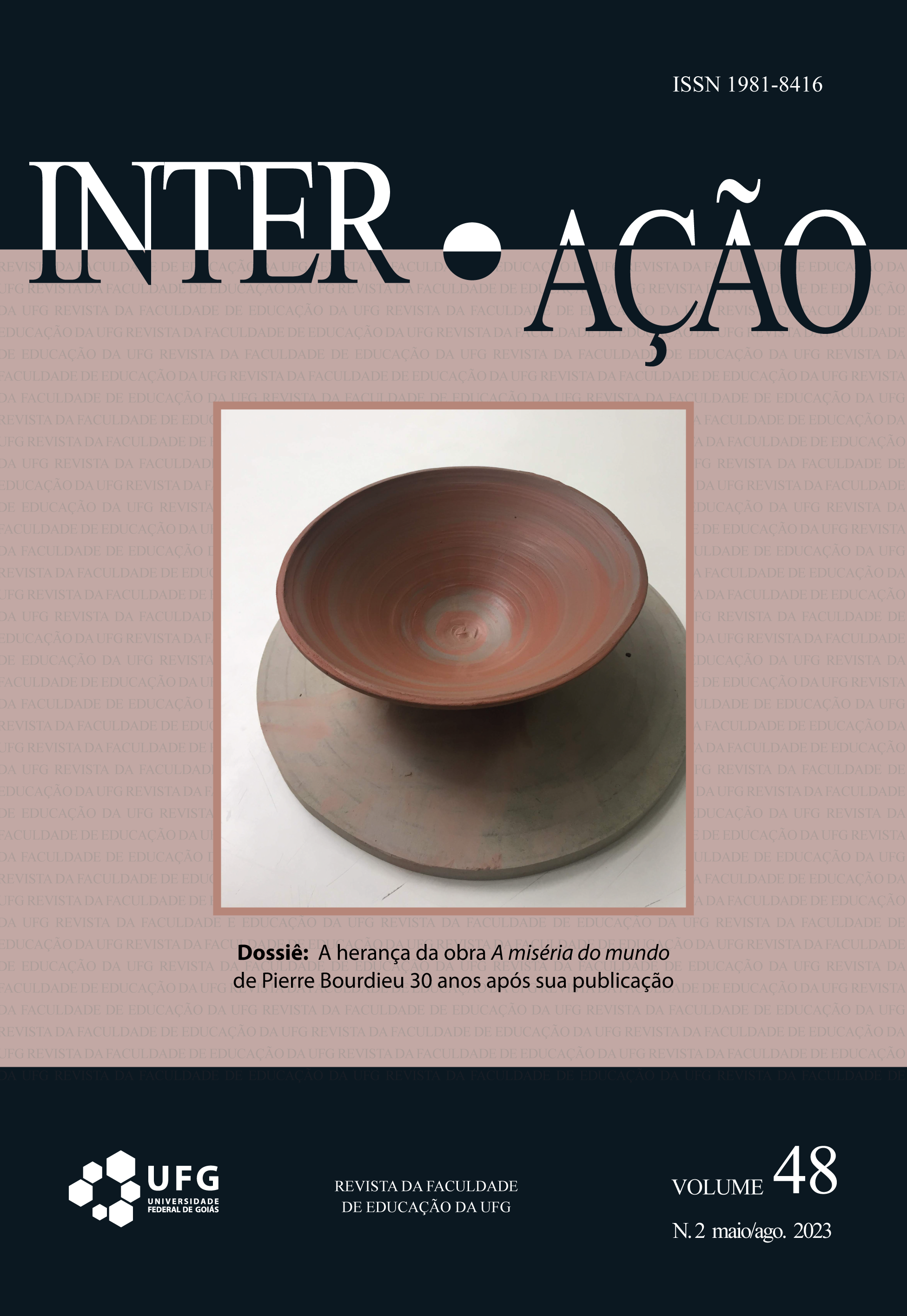EDUCATION AS AN INSTRUMENT OF CULTURAL ASSIMILATION IN GUYANIAN SOCIETY
DOI:
https://doi.org/10.5216/ia.v48i2.75010Keywords:
Educação; Guiana Francesa; Princípio da Igualdade; Racismo.Abstract
The article aims to provoke a reflection about the French educational system, which was based on the principle of equality. This principle, when applied in a universalist and abstract way, comes to be considered a system of domination and acculturation, as well as failing to enable the formation of an identity. In the case of Guyana, the discussions go beyond race and racism. We used qualitative research, semi-structured interviews and observation in data collection. The research revealed that this principle applied in an abstract way makes discussions about rights, race and racism unfeasible, in addition to producing social inequalities. In the educational system, it plays a dual control role: that of maintaining social order and the “civilizing” role that suppresses black identities, while favoring French cultural hegemony.
KEYWORDS: Education; Guyane; Principle of Equality; Racism.
Downloads
References
BARBOSA, J. G. A recepção do instituto da ação afirmativa pelo direito constitucional brasileiro. Brasília, DF: Senado, 2001.
BRASIL. Obras do Barão do Rio Branco III: questões de limites – Guiana Francesa primeira memória. Brasília, DF: Alexandre de Gusmão, 2012.
CAVLAK, I. História da Guiana Francesa. Do início da colonização até a invasão portuguesa de 1808. In: Encontro Internacional da ANPHLAC, 12, 2016, Campo Grande. Anais... Campo Grande: UFMS, 2016.
CLEAVER, A. J. T. “Ni vue, ni connue”: a construção da nação na Guiana Francesa. 2005. Dissertação (Mestrado em Antropologia) – Programa de Pós-Graduação em Antropologia, Universidade de Brasília, Brasília, DF, 2005.
DUARTE, G. R. Guiana Francesa: uma análise geohistórica. Confins, [s. l.], n. 28, 2016. Disponível em: https://journals.openedition.org/confins/11072. Acesso em: 08 ago. 2023.
FRANÇA. Constituição (1958). Disponível em: https://www.conseil-constitutionnel.fr/sites/default/files/as/root/bank_mm/portugais/constitution_portugais.pdf. Acesso em: 27 maio 2019.
GILROY, P. O Atlântico Negro: modernidade e dupla consciência. Rio de Janeiro: Editora 34/Universidade Candido Mendes, 2001.
INSTITUT NATIONAL DE LA STATISTIQUE ET DES ÉTUDES ÉCONOMIQUE -INSEE. Guyane. INSEE. 2019. Disponível em: https://www.insee.fr/fr/statistiques. Acesso em: 08 ago. 2023.
MALINOWSKI, B. Argonautas do Pacífico Ocidental. São Paulo: Abril, 1984.
MAM LAM FOUCK, S. Histoire générale de la Guyane Française. Matoury – Guiana Francesa: Ibis Rouge, 2002.
MAM LAM FOUCK, S.; ANAKESA, A. Nouvelle histoire de la Guyane: des souverainetés amérindiennes aux mutations de la société contemporaine. Matoury – Guiana Francesa: Ibis Rouge, 2013.
MARCONI, M. de A.; LAKATOS, E. M. Técnicas de pesquisa. São Paulo: Atlas, 2002.
MARQUES DE SAES, L. A. A primeira abolição francesa da escravidão (4 de fevereiro de 1794) e o problema dos regimes de trabalho. Sæculum, João Pessoa, v. 29, p. 125-143, 2013. Disponível em: https://periodicos.ufpb.br/ojs2/index.php/srh/article/view/19812/10947. Acesso em: 08 ago. 2023.
MINAYO, M. C. de S; DESLANDES, S. F; GOMES, R. Pesquisa social: teoria, método e criatividade. Petrópolis: Vozes, 2008.
MUNANGA, K. Rediscutindo a mestiçagem no Brasil: identidade nacional versus identidade negra. Belo Horizonte: Autêntica, 2004.
SOUZA, C. B. G. Territorialidades étnicas e identidade nacional: o caso da Guiana Francesa. Geografia Ensino & Pesquisa, [S. l.], v. 16, n. 2, p. 7–22, 2011. DOI: Disponível em: https://periodicos.ufsm.br/geografia/article/view/7331. Acesso em: 08 ago. 2023.
Published
How to Cite
Issue
Section
License
Copyright (c) 2023 Piedade Lino Videira, José José Gerardo Vasconcelos, Elivaldo Serrão Custódio, Enilton Ferreira Vieira

This work is licensed under a Creative Commons Attribution-NonCommercial 4.0 International License.
Inter-Ação uses the Creative Commons Attribution 4.0 License for Open Access Journals (Open Archives Initiative - OAI) as the basis for the transfer of rights. Open access means making documents available on the Internet free of charge, so that users can read, download, copy, distribute, print, search, or link to the full text of documents, process them for indexing, use them as input data for software programs, or use them for any other lawful purpose, without financial, legal, or technical barriers.
Authors publishing in this journal agree to the following conditions:
1) Authors retain copyright and grant the journal the right of first publication, with the work simultaneously licensed under the Creative Commons Attribution License, which permits redistribution of the work with attribution and first publication in this journal.
2) Authors are permitted to enter into additional, separate agreements for non-exclusive distribution of the version of the work published in this journal (e.g., for publication in an institutional repository or as a book chapter), with attribution and first publication in this journal.
3) Authors are permitted and encouraged to publish and distribute their work online (e.g. in institutional repositories or on their home page) at any time before or during the editorial process, as this may generate productive changes as well as increase the impact and citation of the published work.















